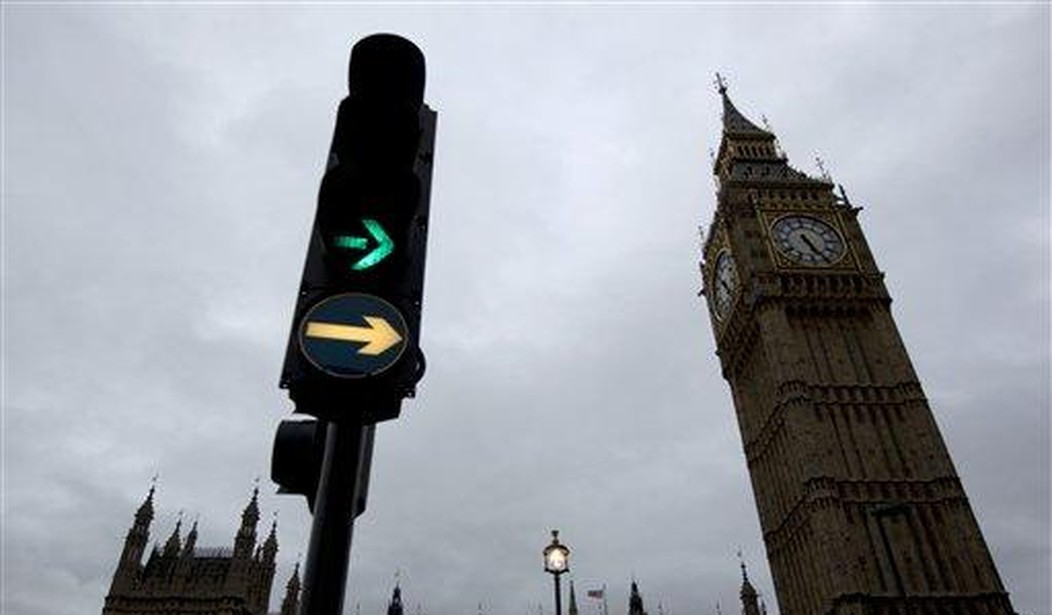It's been awhile since we've written about government-run, single-payer healthcare, although we did mention recently how its budget-focused utilitarianism can lead down some dark paths, as is the case in Canada. Part of the reason we haven't mentioned in much depth lately is that its leading American proponents failed in the 2020 Democratic presidential primaries, and any such plan has zero chance of passage in the current Congress. So long as Republicans control at least one chamber on Capitol Hill, and so long as enough Democrats remain (rightly) skeptical of the massive price tag of implementing such a regime in the United States, the idea is dormant. But it's never dead. Leftists see this as a holy grail, fundamentally altering the relationship between centralized government and citizen. They will never give up the long-term battle to bring such a system to America, and as ascendant generations of lawmakers and activists exert increasing levels of power, the 'progressive' Left will grow in influence. This battle may be temporarily paused, but it's not over.
As a reminder, the cost of instituting a single-payer healthcare system nationwide would be astronomical. Estimates from across the spectrum peg the ten-year number at well north of $30 trillion -- in brand new, totally unpaid-for spending. Those projections almost always invariably rise, as we've again learned with Obamacare (the man who signed it into law has since endorsed single-payer), which was supposed to bend the cost curve down. It has not. Last year, the federal government spent $6.5 trillion in total, much of which was deficit spending. Imagine tacking on additional trillions, every single year, just for this program. Our record-setting tax revenues already fall well short of the existing outlays. The shocking tax hikes required to cover even most of this left-wing dream would be extraordinarily punishing and deeply unpopular. There's a reason why its proponents avoid specifying funding mechanisms like the plague. It's telling that even deep blue states like Vermont and California, where socialists have outsized power, had to abandon plans to install state-level versions of single-payer, due to exorbitant, budget-destroying associated costs.
Yet an awful lot of Democrats want to impose such a regime across the entire nation, which would rip away and outlaw the existing healthcare plans of more than 100 million Americans, most of whom are satisfied with their arrangements. Most House Democrats favor this idea. The sitting Vice President campaigned on it during her brief and unsuccessful 2020 presidential campaign, with other prominent backers advancing far deeper into the nominating process. There is a good chance this will one day become a litmus test for entry into high-level national Democratic politics, even as some of the very liberal old guard is still willing to say the math doesn't even come close to working. The math will only get worse, though the number of Democrats willing to say so could well drastically diminish in the coming years. What these math denialists are agitating for is a government-run system that not only costs a wildly unrealistic fortune, but also (a) faces funding shortfalls resulting in government-imposed rationing, (b) crushes expensive but life-saving innovations, and (c) inevitably precipitates long delays in care. We've covered these impacts in countries like Canada and the UK previously, but a new Wall Street Journal report further spotlights a worsening healthcare crisis in the latter nation:
Recommended
[Britain's] state-funded service is falling apart. People who suffer heart attacks or strokes wait more than 1½ hours on average for an ambulance. Hospitals are so full they are turning patients away. A record 7.1 million people in England—more than one in 10 people—are stuck on waiting lists for nonemergency hospital treatment like hip replacements. The NHS on Monday faced the biggest strike in its history, with thousands of paramedics and nurses walking out over pay. The NHS’s woes are an extreme example of issues playing out across the developed world. Healthcare systems, hit hard by Covid, are under pressure as people live longer and have a wider range of treatment options. Aging populations mean costs will keep growing. The U.K.’s experience is a warning of what happens when supply in healthcare provision can’t keep up with demand.
The NHS has lost thousands of hospital beds in the past decade in its drive for efficiency. Covid delayed treatments for patients, resulting in a vast waiting list. Hospitals in England were already at 98% capacity in December when the brutal flu season began to take hold. The mass of sick patients gummed up the system to devastating effect. Delays in treating people are causing the premature deaths of 300 to 500 people a week, according to estimates from the Royal College of Emergency Medicine, a professional association in London. One in five British people were waiting for a medical appointment or treatment by the NHS in December, according to the U.K. Office for National Statistics (ONS)...Fixing the service will take time, said NHS chief executive Amanda Pritchard. The NHS said that over the next year it aims to cut the average time a heart attack sufferer waits for an ambulance to 30 minutes.
Just before 5 p.m. on Nov. 18, the family of Martin Clark called 999, the U.K. equivalent of 911, after the 68-year-old father of five began having chest pains. After waiting half an hour, the family said, they called again and pleaded for an ambulance, saying Mr. Clark’s condition was getting worse. In another call 15 minutes later, they told the dispatcher they were going to drive him to hospital themselves, according to the family, even though the dispatcher encouraged them to wait for the paramedics. Twenty minutes after the family had left for the hospital, the dispatcher left a voice mail to say the service still didn’t have an ambulance to send. Mr. Clark died shortly after arriving at the hospital.
About a week later, 5-year-old Yusuf Mahmud Nazir died from what began as a throat infection. His family said they had taken the boy, who was having trouble breathing, to the emergency room at their local hospital in Rotherham, which gave him some antibiotic pills after a six-hour wait and sent him home. The family said it pleaded with the hospital a few days later to let Yusuf be admitted and given further tests, but were told the hospital was full. By the time the family got Yusuf by ambulance to another hospital, he had severe pneumonia. He died days later from organ failure and cardiac arrest. “They killed Yusuf—it’s as simple as that,” said Yusuf’s uncle, Zaheer Ahmed, who accompanied the boy’s family at the hospital. “A 5-year-old boy has died of tonsillitis in a rich, industrialized country. It shows the entire system has serious issues.”
On and on it goes: "Almost every day, media reports allege new horror stories: An 83-year-old woman in Leicester with a suspected stroke waited more than 18 hours in a makeshift tent outside a hospital emergency room. A 90-year-old woman with suspected sepsis waited three days. A man in Wales with diabetes lost his toe after it turned blue and then black after he sat waiting for treatment for three days." The story continues, "by this winter, half of all patients in an emergency ward waited four hours or more to be seen by a doctor, and a further four hours on average to get a bed, according to NHS data." This has life-and-death consequences:
A study of more than 5 million patients published in early 2022 by the U.K.’s top medical journal, the BMJ, found that for every 82 people forced to wait beyond four hours for emergency care, one additional person died who otherwise would not have. The longer the wait, the worse the outcomes.
No kidding. The Conservative government has slowed the rate of spending increases at NHS between 2010 and 2020, which some Britons have criticized, but they "sharply increased" spending on the service during the pandemic. Unsurprisingly, however, the government shoveling more and more money into NHS isn't necessarily a path to good outcomes:
Demands for increases in spending are coming up against economic pressures. The Bank of England projects the U.K.’s economy will shrink this year, potentially lowering tax revenues. And as changes in demographics and medical technology continue to weigh on the NHS, ever-higher funding risks crowding out state spending in other areas, such as education and infrastructure. Money alone may not solve the problem, some in the industry warn. In Wales, the regional government has for most years since 2000 spent more money per capita than any region in the U.K. Yet nearly every indicator from waiting times to health outcomes are still worse. One explanation: Wales is both poorer and has the oldest population in the U.K. Focus is turning to whether the system needs to be revamped.
But polling shows that significant reforms to the system could be a tough sell for a public accustomed to the idea of 'free' healthcare, despite the nightmares playing out every day. The Journal's deep dive concludes with one more searing vignette and quote:
Just over a year ago, Akshay Patel, an IT professional in northern England, made five calls to 999 when his mother, Bina Patel, developed breathing problems. Initially the call handler told him an ambulance would be there soon, Mr. Patel said. His mother’s health quickly worsened and she became too sick to be loaded into a car. He watched his distressed 56-year-old mother gradually go pale and die. The paramedics arrived after an hour and were unable to resuscitate her. The local hospital was a 2-minute drive away. “We always believe that the NHS exists for us when we’re in need,” said Mr. Patel. “But personally if I had to call an ambulance. I wouldn’t. I don’t trust them. I can’t.”
This is the model some American ideologues are hellbent on emulating. Their efforts to do so have been stymied thus far, but it's imperative that conservatives -- and anyone else who doesn't want this sort of future -- remain vigilant and ready for this political fight every single time it emerges.
























Join the conversation as a VIP Member